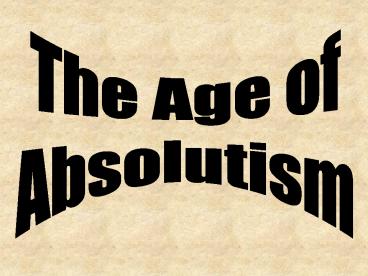The Age of - PowerPoint PPT Presentation
1 / 35
Title:
The Age of
Description:
Wanted a warm-water seaport, end landlocked situation. Peter visited, ... Capital moved from Moscow to St. Petersburg. Forced nobles to shave off their long beards. – PowerPoint PPT presentation
Number of Views:93
Avg rating:3.0/5.0
Title: The Age of
1
The Age of Absolutism
2
- France in the Age of Absolutism.
- Strengthening the Monarchy.
- French Wars of Religion (War of the 3 Henrys)
- St. Bartholomews Day Massacre.
- Thousands of Huguenots massacred
- Henry IV came to the French throne in 1589.
- Founded a new dynasty Bourbon.
- Was a Huguenot, converted to Catholicism.
- Paris is well worth a mass! -
- Issued Edict of Nantes religious freedom to
Huguenots (French Protestants) - Assassinated in 1610 son Louis XIII (8 yrs).
- Cardinal Richelieu advisor.
- Wanted to make the king supreme in Europe.
- Intendants monarchys representatives in the
provinces
3
St. Bartholomews Day Massacre
4
Henry IV
Edict of Nantes
5
Louis XIII
Cardinal Richelieu
6
- The Thirty Years War (1618-1648).
- Protestant rebellion against the HRE.
- Four periods of war
- Bohemia phase
- Danish phase
- Swedish phase (Gustavus Adolphusking of Sweden
saves the Protestant cause) - French-Swedish phase
- Most of the fighting took place in Germany.
- France kept out of the war grew stronger.
- Policy of Cardinal Richelieu
- Result Germany devastated Alsace to France.
- Treaty of Westphalia (1648) independence to
Netherlands Switzerland
7
- Louis XIV (king for 72 years, 1643-1715)
- the sun king
- Built a huge palace at Versailles
- Drained the French treasury
- Epitomized divine right of kings
- Letat cest moi
- Revoked the Edict of Nantes (1685)
- Financial advisor, Jean Baptiste Colbert
8
Thirty Years War
9
Treaty of Westphalia
10
Louis XIV
11
Versailles
12
(No Transcript)
13
(No Transcript)
14
Orangery
15
(No Transcript)
16
Hall of Mirrors
17
Gallery of Battles
18
Versailles Opera Stage
19
Chapel
Altarpiece
20
(No Transcript)
21
(No Transcript)
22
Versailles Statistics
2,000 acres of grounds 12 miles of roads 27
miles of trellises 200,000 trees 210,000
flowers planted every year 80 miles of rows of
trees 55 acres surface area of the Grand Canal
12 miles of enclosing walls 50 fountains and 620
fountain nozzles 21 miles of water conduits
3,600 cubic meters per hour water consumed 26
acres of roof 51,210 square meters of floors
2,153 windows 700 rooms 67 staircases 6,000
paintings 1,500 drawings and 15,000 engravings
2,100 sculptures 5,000 items of furniture and
objects d'art 150 varieties of apple and peach
trees in the Vegetable Garden
23
Jean-Baptiste Colbert
24
- The Wars of Louis XIV.
- Balance of power
- The War of Spanish Succession.
- Fought in Europe, North America, and at sea.
- Treaty of Utrecht.
- The Legacy of Louis XIV.
- France gains a foothold in N. America fur
trade. - Wars drained the French treasury.
- France leading power in Europe (for a while).
25
- Russia in the Age of Absolutism.
- Isolation of a New Dynasty.
- Geography separated Russia from Europe.
- Sweden, Poland blocked access to Baltic Sea.
- Ottoman Turks controlled the Black Sea.
- To the west, vast Polish plains blocked trade.
- None of Russias rivers flowed into the seas.
- Use of Cyrillic alphabet (Europe used Roman).
- Time of Troubles (1604-1613)
- Over 30 leaders
- 1613 new czar Michael Romanov.
26
(No Transcript)
27
(No Transcript)
28
Michael Romanov
29
- Peter the Great ruled from 1689-1725.
- Sought to modernize Russia.
- Wanted a warm-water seaport, end landlocked
situation. - Peter visited, met with leading scientists,
artisans. - 1700 started a long war with Sweden.
- Russia wins in 1721 gains access to Baltic Sea.
- Decisive battle Poltava.
- Capital moved from Moscow to St. Petersburg.
- Forced nobles to shave off their long beards.
- Created a new system of nobility.
- Czar granted nobles large estates with serfs.
- Serfs conditions worsened.
30
Peter the Great
31
Peter the Great at the Battle of Poltava
32
- Catherine the Great (1762-1796).
- German princess married to Peter III.
- Peter III murdered by nobles who supported
Catherine. - Catherines policies.
- Supported art, science, literature, theater.
- Continued expansionist policies of Peter.
- Gained control of Black Sea, Crimea (Turks).
- First Partition of Poland (with Prussia and
Austria). - Poland disappeared from map of Europe until 1919.
- Added more than 200,000 square miles to her
empire. - Expanded eastward to Siberia rich in natural
resources. - Set up colony in Alaska.
33
Catherine the Great
34
Peter III
35
(No Transcript)































